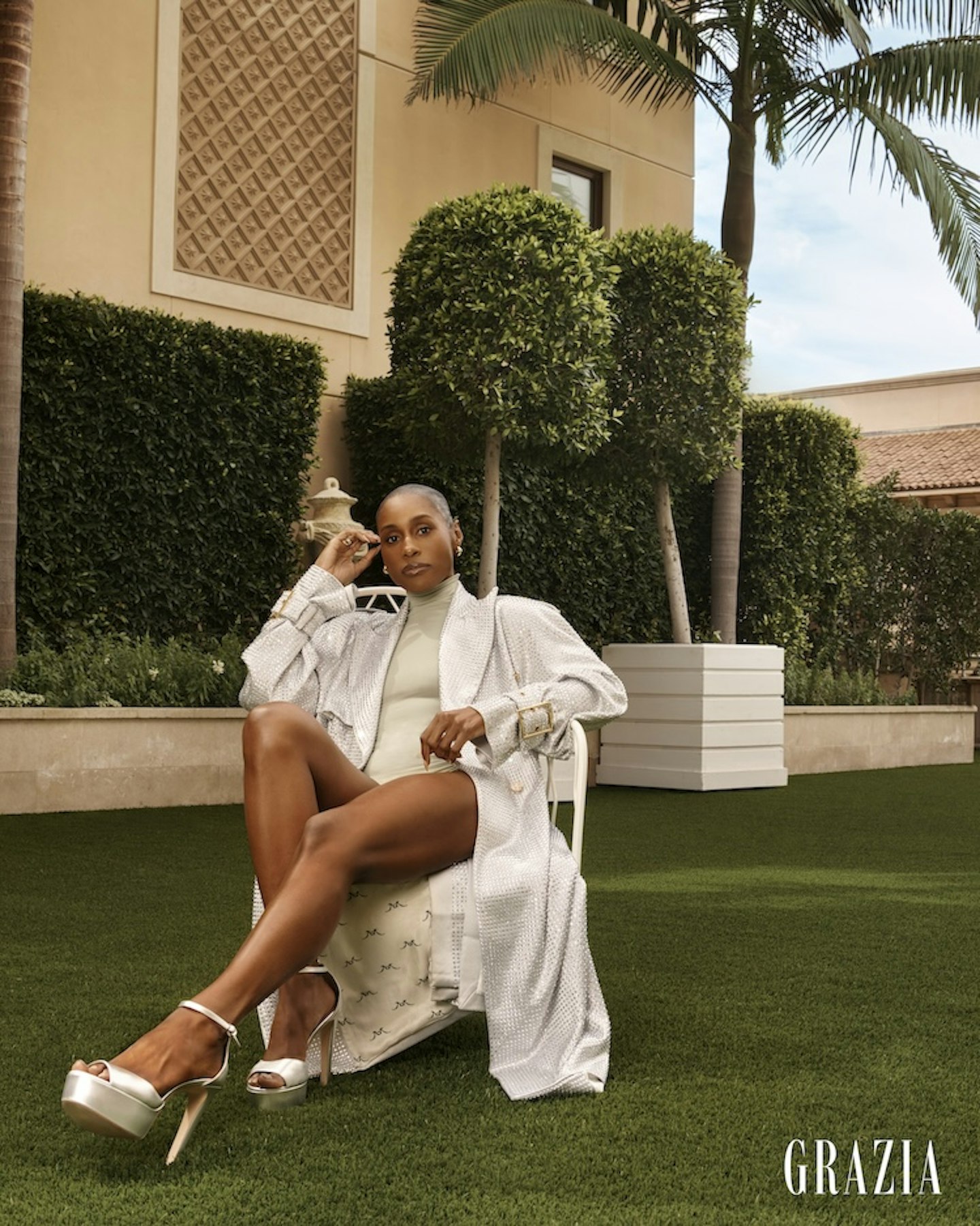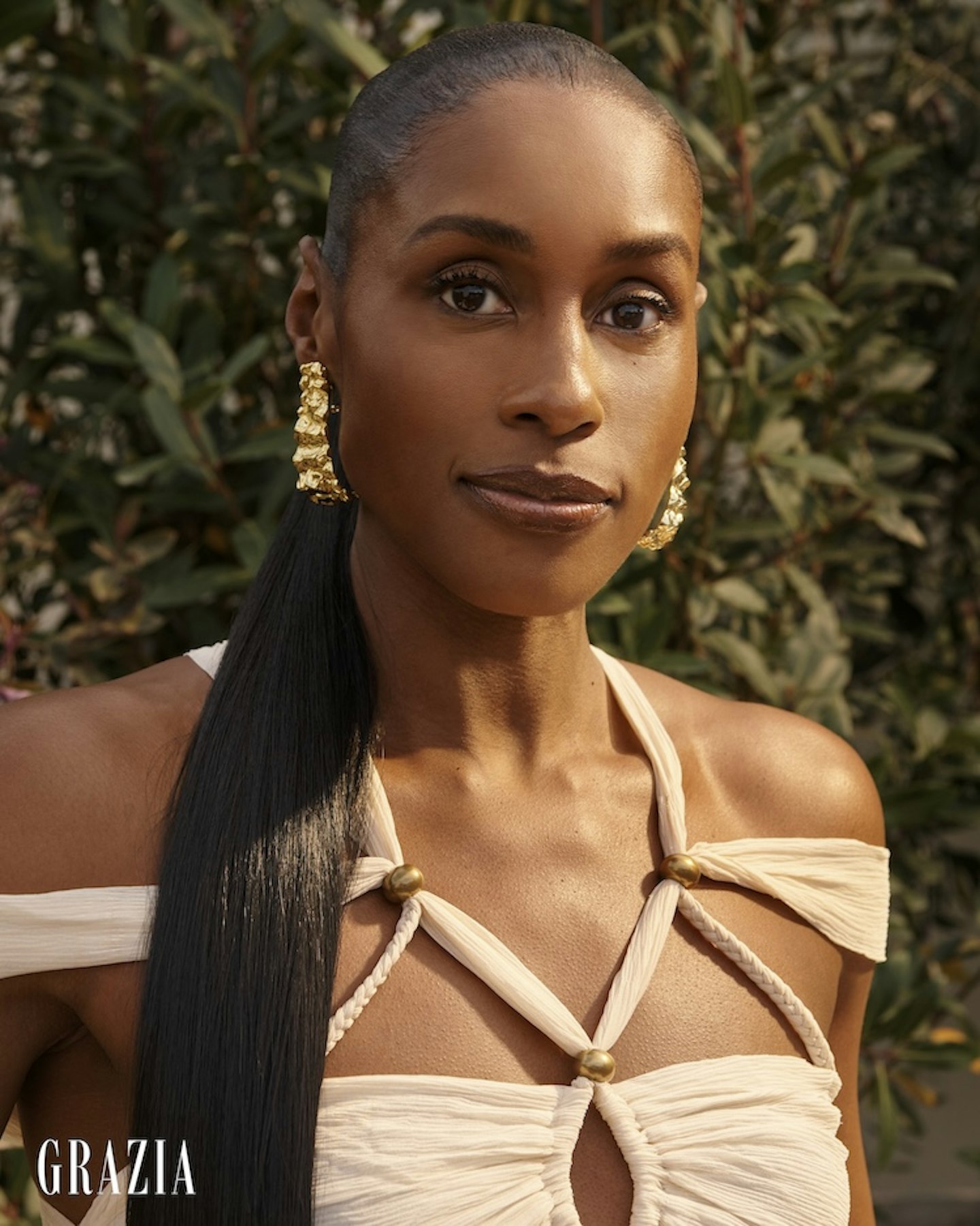It may only be 7.45am in Los Angeles when we speak, but Issa Rae is full of energy. In fact, she’s been up for hours. ‘From 4am to 6-6.30am is my time. I wake up, work out, journal and then, around 7am, the work starts,’ she says. For a creative as prolific as Rae, who juggles writing, acting, producing and running multiple business, it’s the only time she can carve out those ‘precious hours’ for herself.
The mastermind and star of beloved Emmy-winning comedy Insecure, which followed two friends trying to make it in LA and ran for five critically acclaimed seasons, says that four years after the finale there is still huge affection for the show. ‘It’s still what I get stopped most on the street about,’ she says. ‘What I took from that show is the ability to start conversations and form community. I love that people are still connecting with it now.’
The success of Insecure propelled Rae to become one of the most exciting talents in Hollywood, founding her own production company, Hoorae, writing a New York Times best-selling memoir, The Misadventures Of Awkward Black Girl, appearing on the cover of Time, and starring in films from coming-of-age tale The Hate U Give to whip-smart satire American Fiction – not to mention Barbie, as President Barbie. Who else?

This month, she stars in cult dystopian drama Black Mirror on Netflix. In her episode, Hotel Reverie, Rae plays A-list actor Brandy, who is craving a role she can immerse herself in – which takes a literal turn when she finds herself inside a 1940s black-and-white movie (with co-star Emma Corrin) thanks to AI. ‘Reading the script, I was enthralled,’ says Rae. ‘Like most Black Mirror episodes, it was like, “This could really happen.” I could see this technology existing. [It] appealed to me in a really frightening way.’
It’s very meta, considering how Google and Open AI are now lobbying for the US Government to designate copyrighted art, movies and TV shows as ‘fair use’ for them to train AI. How, as a creator, does this make Rae feel? ‘Part of me – a lot of me – hates it, that they can just take our material and use it to train models,’ she says. ‘But another part of me knows that the Government is very slow to regulate, and it really is going to come down to us as creators to take a stand. The more we treat this as unacceptable and draw clear lines in the sand, the more effective it will be.’
While Rae has been hustling in the entertainment industry since 2011, being part of the record-breaking Barbie juggernaut was an experience. ‘People still call me President Barbie – that will forever be cool to me,’ she says. ‘I think it’s definitely raised my [profile]. And it’s increased my points with my niece and nephews!’ As for the impact Barbie has made on the wider industry, Rae suggests that its full ripple effect is still to come. ‘I feel like we had this moment where we were like, “More women-directed movies! More female-centric films!” Like we always do when there’s something successful. But we’re not seeing the effects of that yet. I think this last happened with Wonder Woman, and then there was a dearth again.’
As a result, does she feel a responsibility to tell women’s stories? ‘A responsibility, no, but a desire, absolutely. I feel like I could write a male story. In fact, I actively am. There are, of course, elements where I need to do research; and there are certain parts of being a man that fascinate me, but only through the lens of being a woman and how they impact us,’ she explains. Still, much of her work follows the lives of women. ‘I like stories about women. There aren’t enough,’ she says. ‘I feel the responsibility to broaden what that audience might look like, where people aren’t as dismissive of women’s stories, saying, “That’s a chick flick.”’
She reflects on a line from her character in Black Mirror, who is ‘tired of playing the noble victim or fuckable sidekick’. ‘I definitely relate to that,’ says Rae, sharing her frustrations on being told what will and won’t ‘work’ for the market right now – particularly on the other side of the Diversity, Equity and Inclusion ‘retaliation’. ‘People are scared to tell stories that feel too diverse. I’ve even gotten feedback a couple of times for a script where, internally, they’ll be like, “Is this too Black?” And I’m like, “What? We’re asking this question now?” We’re back in time. So I identify with Brandy’s frustration of being out of control about how the industry sees you and your value and wanting to be more active in that change.’
Telling Black stories has always been central to Rae’s work. She began making mock documentary series Dorm Diaries while at Stanford University, showcasing the lives of Black students, which was followed by comedy web series The Misadventures Of Awkward Black Girl in 2011. These selfmade series came from a desire to fill the glaring gap on TV. ‘I loved television,’ she says, referencing The Fresh Prince Of Bel Air, Living Single, Moesha and Family Matters as major influences. ‘When I didn’t feel like we were represented, my reaction was, “OK, let me create my own bootleg version of what this looks like and maybe that’ll inspire it to be on screen.”’
In 2020, she consolidated her production ventures under one company, Hoorae, to have more ownership of the stories she was telling. ‘I want to have a stake in [what] I make. I want to be able to finance and greenlight movies that I believe in,’ she says. Hoorae productions already include A Black Lady Sketch Show, Rap Sh!t and One Of Them Days starring SZA and Keke Palmer.

Hoorae's latest release, launched during Rae’s keynote talk at this year’s SXSW festival in Austin, is Seen & Heard – a docuseries chronicling TV history and Black representation. ‘We made it during what was like the “Black renaissance” of TV, when there were all these shows on the air. We wanted to capture this time… and make sure that this moment lasts,’ says Rae. ‘Rewatching it, I get upset because it’s so prescient – it constantly feels like we have these booms, and then we’re trends and then we’re not relevant to the industry any more. But it’s inspiring to watch.’
Seen & Heard features icons including Oprah Winfrey, Tyler Perry, Shonda Rhimes and Ava DuVernay, creatives who established themselves in a media industry that long refused to create space for them. How does it feel to now have her name often mentioned alongside theirs as a figure also paving a way for representation? ‘I have a long way to go before I feel like I can actually hold my own alongside them. But they are definitely inspirations to me.’
Alongside these entertainment greats, Rae can add Michelle Obama to her contacts lists, having been the first guest on her podcast IMO when it launched in March. Does it ever feel normal, going to work with Michelle? ‘No!’ she laughs. ‘Because I know she’s a Capricorn [like me], I’m like, “I understand you.” But that doesn’t mean I wasn’t showing the utmost respect. [There’s] a reverence, like, “This is the aunt that I don’t fuck up around.”’ As for Oprah, ‘I don’t know that she’s a real person to me,’ she laughs. ‘She’s so wrapped up in culture and my family’s memories. What she’s built based off of being entirely herself and trusting her gut, I respect that so much.’
Speaking of empires, Rae is very much on her way to creating her own. Alongside Hoorae, she has launched audio label Raedio, management company Color Creative and marketing agency Fête, and co-owns a series of businesses, including haircare brand Sienna Naturals with her sister-in-law, and LA’s Somerville restaurant and café chain Hilltop Coffee + Kitchen. ‘They were all born out of an organic desire,’ she says, though she admits balancing it all is ‘exhausting’. ‘Running the business side has fun elements, but it’s a full-time job, though I don’t want it to be, as I like creating.’ Though having to use a different part of her brain does have its benefits. ‘When I have writer’s block and I don’t feel inspired, it is a relief to have these businesses as my outlet.’
With so many professional opportunities in motion, what could possibly be next? Well, she’s just entered a new decade, having turned 40 in January. Looking ahead to this next chapter, ‘I’m actually excited. I feel powerful, I feel strong, I feel motivated and I feel like the best version of me is here. I have such a renewed confidence that I’ve never felt before. I’m excited.’
Stream ‘Black Mirror’ on Netflix now
Photography by Sam Gold. Styling by Wuori Vice. Shot on location at The Maybourne, Beverly Hills.
Top image, Issa wears: Bra and skirt, both Diotima; shoes, Stuart Weitzman
